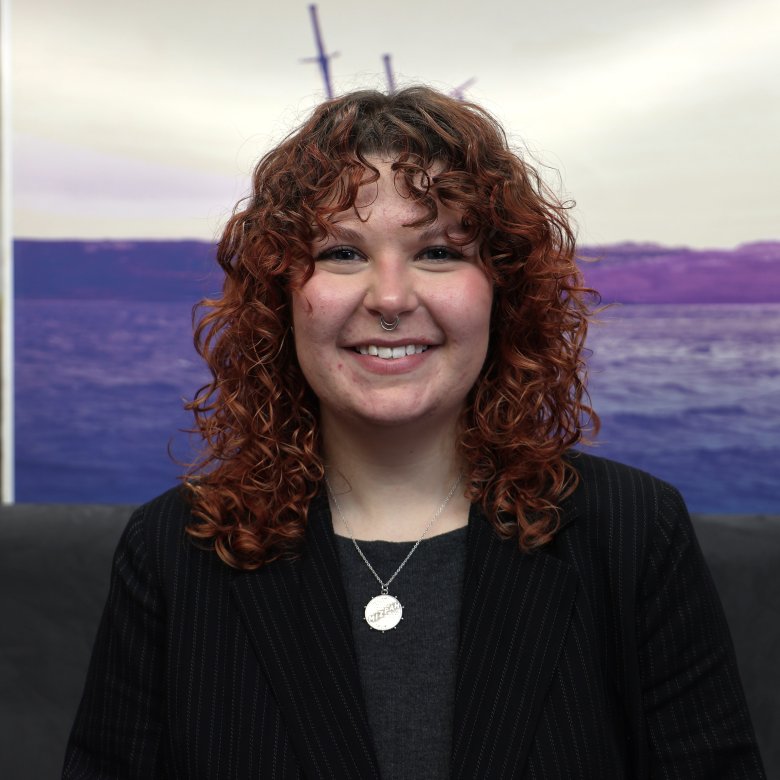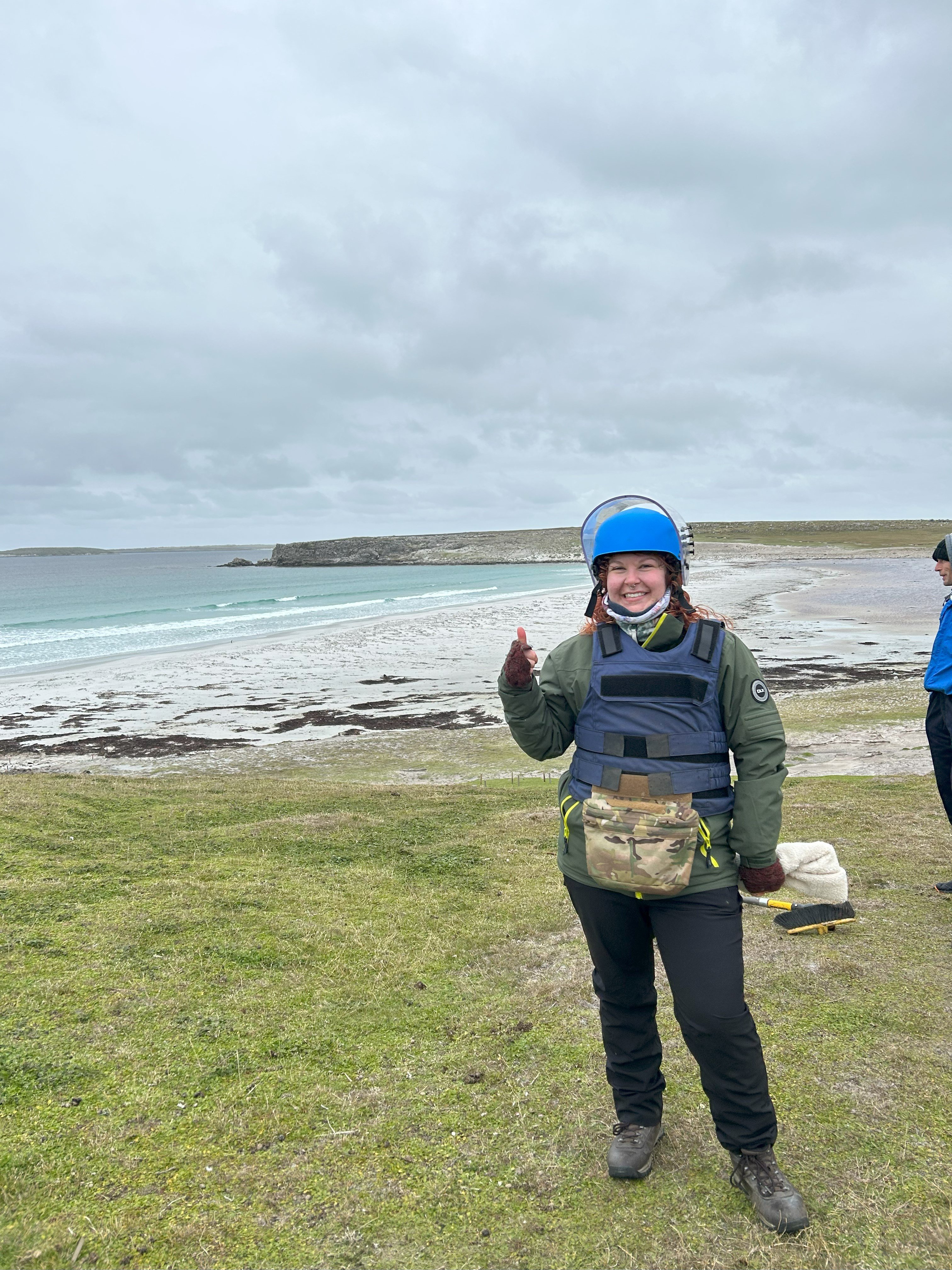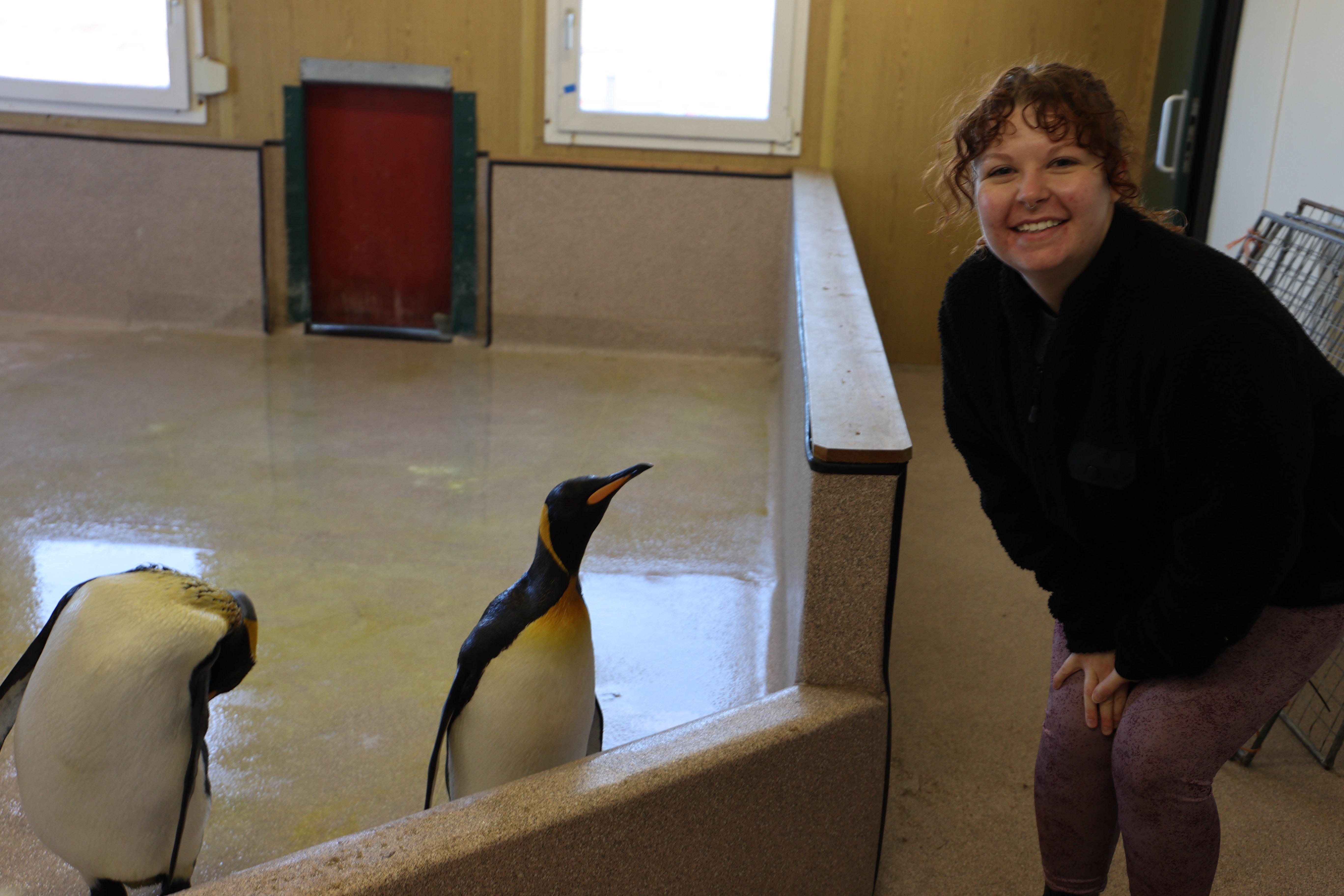Graduate Spotlight: broadcast journalist Amy Colman
24 October 2024

Amy Colman, who graduated from Journalism & Creative Writing BA in 2023, has landed a job that's "cool" in every sense of the word: Broadcast Journalist at Falkland Islands TV (FITV).
Following in the footsteps of fellow Falmouth graduate Hannah Newton, who is now Station Manager at FITV, Amy recently set off to the Falkland Islands – known for their low temperatures and large penguin population. Amy told us all about this fantastic opportunity, how her degree prepared her and how a guest lecture opened the door to the role.
Hi Amy, tell us a bit about yourself...
I’m from the Black Country in the West Midlands and studied Journalism & Creative Writing at Falmouth. I initially studied Fine Art BA for a year and a half before the Covid-19 pandemic hit, and all sense of my creativity scarpered. So, I quickly and haphazardly swapped to Journalism, fuelled by my natural curiosity (which some may call 'nosiness'). Straightaway I knew it was the right decision for me. I’ve always been a ‘Chatty Cathy’ as my mom would put it, so I think working in the communications field is pretty fitting. After graduating I did a few small roles including podcast producer intern and creative communications assistant. Eventually, I landed a unique role as a Broadcast Journalist at FITV.
How have the first few months of the role been?
I’ve been here now for just over six months and have been really enjoying the unique lifestyle that the Falklands offers – and I’m somewhat obsessed with explaining this place to outsiders!
It’s a very surprising place, and its remoteness facilitates such an interesting culture. The population is tiny, so the community is very tight-knit but also diverse. The lack of people means there’s a high employment rate and many people come from overseas to work here and fill the jobs needed. So, whilst the Falklands culture is strong, it is fragile with the influx of newcomers, so a lot of those whose families have called the Falklands home for generations are protective of it.
I suppose it is mostly known in the UK for the war and the scars of the conflict can be seen and experienced at every corner. In fact, one of my first stories was being sent out to document a de-mining operation nearby. It was spectacular being 100ft from live ammunition in a crystal-clear bay, where dolphins were swimming all day, and three penguin colonies were roaming around. There’s a picture of penguin footprints right next to mine, which is pretty unusual.

The job is very varied day to day; one day I’m at the governor's house interviewing local influential women for International Women’s Day, and the next I’m head-to-toe in outdoor gear, travelling out to a peatland in a blizzard to see the flux towers which measure greenhouse gas emissions from the peat! It certainly never gets mundane. I’ve been getting really interested in agriculture whilst here as the culture is rich with agricultural history. It’s very important to the islanders' culture, but is becoming more and more difficult as the land here is drying and becoming harder to manage. I recently made a documentary on the kelp industry here, as kelp is hugely abundant and has been thought to essentially be an 'untouched goldmine' for over a century.
How did this opportunity arise?
How I got this job is quite a funny story. I actually met the former boss of the company when they took a trip to Falmouth University to talk to us back in the first year of my Journalism BA. They told us about life here, what it’s like to live so far away, and what you might have to sacrifice. It all sounded scary to me being so new to journalism, so I wrote it off as a ‘I could never do that’ situation and moved on.
However, once I left university and was tirelessly searching for jobs, I stumbled across FITV’s job advert for the Broadcast Journalist post, and after being so burnt down from rejections, I applied with a ‘may as well’ kind of attitude. Expecting nothing to come of it, I sent off an email with my application and mentioned how I’d previously met the former boss and heard all about the role and finally thought I might be able to handle it.
Much to my surprise I got asked to submit a video report as part of my application and filmed it with my brother on the same day he picked an engagement ring for his now fiancé… it all felt a little surreal. A short while after I had an interview with my now boss and another colleague, and three days letter received an ominous email asking for a quick video call. After a pep talk in the mirror about being able to deal with another rejection and agreeing that if I didn’t get it, I’d get a full-time job in hospitality and eventually save enough to travel, I got offered the job.
They gave me a huge list of visa requirements, a medical, a dental, a police record check and they hoped at the earliest I could be there in a month. After everything visa-wise miraculously went to plan, I found myself outside RAF Brize Norton a month later ready to board an 18-hour flight to the Falklands.
Do you feel studying at Falmouth prepared you for this role?
Besides Falmouth facilitating meeting the contact that possibly contributed to getting me the job, it also prepared me in other ways. I think the best thing about the Journalism & Creative Writing BA is the lecturers and their willingness to help you succeed. I asked my lecturer Kevin Bishop for no end of advice in getting a job whilst at university and afterwards, and they all instilled confidence in me and my work. That accounted for a lot of the perseverance through the rejections, for which I’m endlessly grateful. If I hadn’t held on that bit longer with the job search, I wouldn’t have ended up here.

The course itself equipped me with such a wide range of skills and experience that I could fall back on. It helped a lot in having a base knowledge in lots of things so I felt I could apply to a wide scope of positions as a result.
What does the future look like for you?
As much as I’m enjoying my present experience here, I am looking forward to seeing what’s next. I think landing this job is going to give me a solid grounding in my career and open my options up for the future. The scope of the job will help too because we do everything in the production of the show; from researching, pitching and planning to filming, editing, publishing, social media, and hosting the shows; all of this across a huge scope of subjects within a small community.




